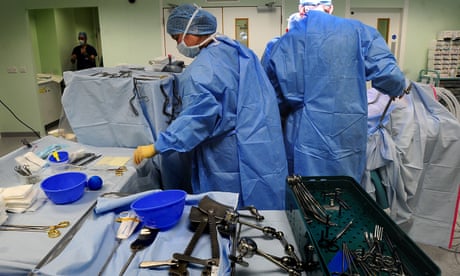
Medical device companies are paying millions of pounds to hospitals in the UK to fund staff places, as well as training and awareness campaigns, while pushing sales of their products, including implants, heart valves and diagnostic equipment, a new report reveals.
An analysis of disclosures by medical device companies found that between 2017 and 2019 they reported €425m (£367m at today’s rates) in payments to healthcare organisations in Europe, according to the study in the journal Health Policy and Technology.
The businesses reported paying more than €37m to hospitals and other healthcare bodies in the UK over the three-year period. The disclosures include payments to some of the biggest hospital trusts in England.
James Larkin, one of the authors of the study and a postdoctoral researcher at the Royal College of Surgeons in Ireland, said the filings did not include consultancy fees for medical staff and many companies did not register their payments. “This is just the tip of the iceberg,” he said. “There is a huge number of payments that are not being disclosed. The descriptions for payments which are disclosed are very vague and it is not completely clear what they are for.”
There are concerns that payments from pharmaceutical and medical companies to health organisations can influence clinical decisions to use certain drugs and products. The Observer revealed last year that payments to UK health organisations and professionals reached a record £200m in 2022.
The Association of the British Pharmaceutical Industry (ABPI) has published a database called Disclosure UK since 2016 under which drugs companies disclose payments to healthcare organisations and individuals. It does not include payments by medical device companies.
The new report analysed the disclosure database recording payments made by members of MedTech Europe, the European trade association representing the medical technology industries, from diagnosis to cure. The disclosures, logged on the transparentmedtech.eu database, cover educational grants, fellowships and public awareness campaigns.
The pharmaceutical multinational Johnson & Johnson disclosed the highest value of payments, with €184m to 27 countries. US company Abbott Laboratories paid €44m.
The report stated: “These payments provide medical device companies with an opportunity to influence a range of [organisations] such as hospitals, universities, and professional training bodies, all of which significantly influence healthcare practice.” It said the potential conflicts of interest highlighted the need for a publicly mandated disclosure database.
In the UK, Johnson & Johnson, which manufactures products including hip implants and surgical robotics, has made “educational” payments to several hospital trusts, including Guy’s and St Thomas’ NHS foundation trust, Barts Health NHS trust and South Tees hospitals NHS foundation trust. The US company Edwards Lifesciences, which makes heart valves, has made payments to at least five NHS hospital trusts. They include a 2022 grant of £67,650 to fund a “nurse educator” at King’s College hospital NHS foundation trust to support the delivery of a valve implantation programme.
A review published by Julia Cumberlege in July 2020, entitled First Do No Harm, which examined how the health system in England responds to reports from patients about side effects from treatments, flagged up concerns over payments from manufacturers to doctors and healthcare organisations.
Lady Cumberlege’s report said there were public concerns that such payments could influence medical practice and proposed a mandatory register. The government had a consultation last year on the possible introduction of regulations mandating the disclosure of industry payments to the healthcare sector.
Jonathan Evans, director of communications at the Association of British HealthTech Industries (ABHI), the UK’s leading industry body for health technology, said the relationship between medical device companies and healthcare professionals was crucial to the advancement of safety and patient outcomes. He said: “This is necessary to support training, education and product development that can advance the best possible patient care.”
Evans added that under the ABHI code of practice, all transactions between a company and a healthcare professional were reported to the NHS employer.
Johnson & Johnson said it was committed to transparency and supported the mandatory disclosure of educational grants. Abbott Laboratories and Edwards Lifesciences have been contacted for comment.
Hospital trusts said they had strict policies to manage conflict of interests and income received from working with medical device firms.
Guy’s and St Thomas’ NHS foundation trust said: “We are one of the largest, most research active trusts in the country and work with medical device companies to develop better treatments that improve the quality of care for our patients.”
A Department of Health and Social Care spokesperson said: “Transparency is vital to the healthcare system and doctors are already required to declare their conflicts of interest. Last autumn we consulted on proposals around the disclosure of industry payments to the healthcare sector. We are considering the responses to the consultation and a response will be published in due course.”